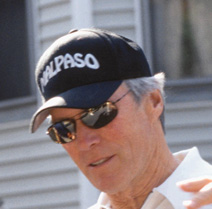 Clint Eastwood ('Mystic River')
Clint Eastwood ('Mystic River')
'A New Unforgiving River Now Runs'
Clint Eastwood grew up in Depression-era California, where his parents were itinerant workers. After high school, he worked as a lumberjack in Oregon, played honky-tonk piano and was a swimming instructor in the US Army. On the GI Bill, he studied at Los Angeles City College. Signed by Universal, one of his first experiences with the indignity actors must suffer was in a 'Francis the Talking Mule' movie, 'Francis in the Navy' (1955). Many B-movies later, he moved to New York and gained recognition as trail boss Rowdy Yates in the successful TV series 'Rawhide' (1959-66).
Years later and he was the man with no name in Sergio Leone's 'Dollars Trilogy', but for over 40 years Clint Eastwood has been a household name. As an actor, he's been memorable in such classics as 'The Good, The Bad And The Ugly,' 'Dirty Harry,' and 'Escape From Alcatraz.' But it's as a director that Eastwood has really flourished, turning out thoughtful character studies like 'A Perfect World,' the Oscar-laden revisionist western 'Unforgiven,' and now the haunting crime drama 'Mystic River' - adapted from the best-selling novel by Dennis Lehane.
With my heart pounding, my head pulsating and with my hands shaking, my proposed phone interview with Clint Eastwood was made reality when the big man himself came on the line. Speaking low, quietly, methodically, Clint first revealed what it was about Dennis Lehane's novel that he thought would translate to film? "There was no single thing, just reading the whole book. I read a synopsis and loved the idea, and I had liked Dennis Lehane before - his detective novels. But this was a whole different ball game as far as I was concerned. The story from the very beginning, and from Dennis Lehane's approach to it, was as this Americanised Greek, or Shakespearean tragedy because there is that moral ambiguity."
"I've always been fascinated with the stealing of innocence. It's the most heinous crime, and certainly a capital crime if there ever was one. I think anything to do with crimes against children is something that's very strong in my mind. So, that's what attracted me to this story - the fact that it comes back in adulthood, and things keep coming around. I just liked the story and figured I had to do it."
It feels almost like a companion piece to Unforgiven in that it's about the consequences of violence. How conscious were you of that? "I didn't purposely try to find a companion piece to 'Unforgiven,' but I guess, without thinking about it too deeply, I am interested in the results of violence, and the effects of it on the perpetrator as well as the victim."
It's also a very intricate story of three lives intertwining. Was it difficult to get the balance right? "It's a great story with a lot of layers to it, and every role was really good. Laurence [Fishburne] came in to be the guy who we, as the audience, would see from a businesslike point of view. He's the voyeur for us in this neighbourhood. And Tim's [Robbins] role was an unusual casting. I guess it would've been tempting to cast a smaller, more vulnerable looking man in the part, but it worked in opposite, because he was so very effective in the way he submerged himself in this particular role."
And how did Kevin Bacon and Sean Penn come on board? "Kevin and I had once talked about working together years back, and Sean also. People ask me about Sean and I say he's highly rated - and he's better than he's rated. I'd say the same for the whole cast. I had the absolute best cast I've ever assembled, so it just made it easy for me."
Casting Eli Wallach in a small role was an interesting touch. The last time you worked together was on 'The Good, The Bad, And The Ugly', right? "Thirty-seven years since we worked together, so there's a little history there. We worked together on the plains of Spain, the only two gringos in the production, and it was a great time. It was great to see him again - to look across the camera and see him out there."
And how was it for you directing a cast of actors who are also directors? "The fact that these fellas - the four principal men - had all directed films before is actually an asset, because I've always felt that every actor should direct a film at some point in their life, and every director should act. In this way it makes everybody understand what the process is. You hear about actors being late and all that sort of stuff, but you never find that with an actor who's directed, because an actor who's directed understands all the problems your production is going through. It was great for me. They understand the language, so there's very little discussion needed."
You also devised the music for 'Mystic River'. It's a beautiful score, but what made you confident enough to think you could pull it off? "I grew up with a great interest in music, and studied intently for a few years, but left it behind. But I think every film has its rhythm. In the case of this film, it has two rhythms: the Kevin Bacon/Laurence Fishburne rhythm, and the rhythm that Tim and Sean, and Marcia Gay and Laura Linney have. So it was about blending those rhythms as their stories all converge. If you ever go to a music session, you'll notice that the musicians can sit down and start playing right away, and everyone knows what to do. Of course they're reading it, but the conductor can tweak little things, and you can take that back to directing motion pictures."
Interviewed by Rosa Markens for Exclusive Magazine
Back To Archives

